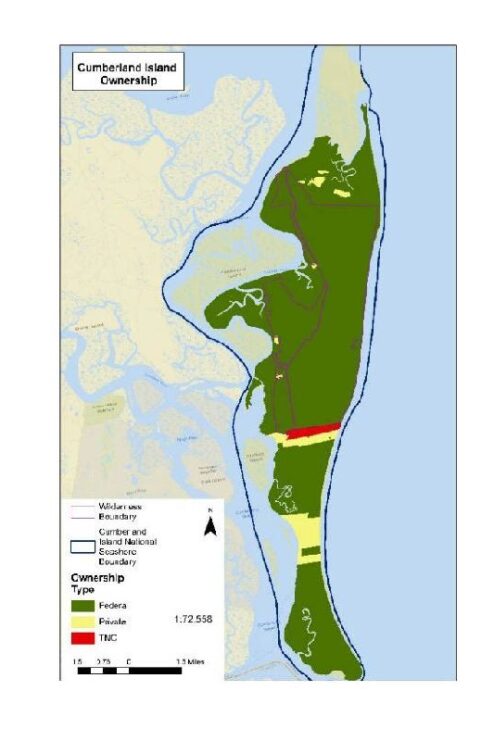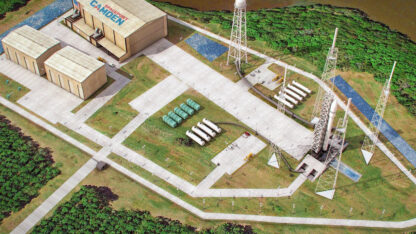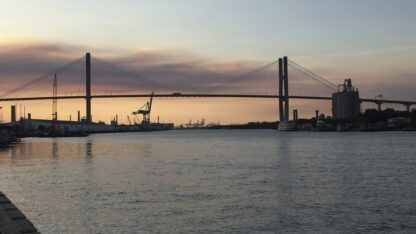Cumberland Island National Seashore to expand

The land being added to the national seashore currently belongs to the Nature Conservancy, which bought it in 1999 as part of a larger purchase of 1,108 acres. Most of that land – 934 acres – was already transferred to the Park Service. (Photo courtesy of Cumberland Island National Seashore)
This coverage is made possible through a partnership between WABE and Grist, a nonprofit, independent media organization dedicated to telling stories of climate solutions and a just future.
Georgia’s Cumberland Island National Seashore will soon expand when the National Park Service (NPS) acquires an additional 173.7 acres of the island. Congress allocated $8.7 million for the land acquisition in the omnibus appropriations bill that passed in December.
“This will transfer to the National Park Service ownership of one of the last remaining significant privately held lots on Cumberland,” said Democratic U.S. Sen. Jon Ossoff of Georgia, who led a bipartisan effort to acquire the land for NPS. “And that will protect this precious ecosystem for recreation, for conservation, for tourism, and as scenic open space.”
Ossoff and Republican U.S. Rep. Buddy Carter, who represents the coast, requested the funding in the appropriations package.
Cumberland is Georgia’s largest barrier island, and it’s largely undeveloped wilderness. Most of the island is a protected national seashore managed by the NPS. It’s mainly accessible by ferry and a popular destination for camping and hiking.
But when Congress designated the national seashore in 1972, some private land was carved out – mostly belonging to descendants of the Carnegie and Candler families. Some of that land remains in private hands, and will even after this sale.
The land being added to the national seashore currently belongs to the Nature Conservancy, which bought it in 1999 as part of a larger purchase of 1,108 acres. Most of that land – 934 acres – was already transferred to the Park Service. The remaining land was managed by the Park Service while TNC retained ownership.
“This land on Cumberland Island is one of the last undeveloped and unprotected beachfront tracts in Georgia,” TNC leaders Monica Thornton and Nancy-Clair Laird McInaney wrote in a Feb. 6 letter to Ossoff. “Integrating this land into the Cumberland Island National Seashore will ensure its long-term protection and will provide many benefits for coastal resiliency, the local economy, public recreation, and military readiness.”

Managing a treasure
Cumberland is a beloved destination for many, in large part thanks to its undeveloped wilderness.
“I spent happy times camping and hiking at Cumberland Island as a child as so many Georgians have, and look forward to taking my one-year-old daughter there,” Ossoff said.
Disputes often arise over how to maintain the island’s wild state while ensuring the public can access and enjoy it.
Most recently, NPS proposed a new Visitor Use Management Plan that calls for increasing the number of daily ferry passengers to Cumberland from 300 to 700 and selling some essentials like sunscreen and bug spray on the island. Officials said the goal was to help more people experience Cumberland Island – especially historically disadvantaged groups.
“During my conversations with parents, it became evident to me that many born and raised in our local area have never been to Cumberland Island,” seashore Superintendent Gary Ingram said in a virtual town hall last year. “This group was far more diverse than the majority of people that visit the park.”
But critics said the plan wouldn’t really achieve that goal – and could harm the primitive wilderness areas Cumberland is known for.
“When you start talking about adding retail and about commercial services, and infrastructure, in what are some very protected areas and adjacent to critical habitat, we have to think very carefully about whether those visitor accommodations are necessary,” said Jessica Howell Edwards of conservation group Wild Cumberland.
She said other changes would be more effective, like discounting admission for locals and providing wilderness gear that visitors can borrow from libraries.
NPS is reviewing the public input on that plan and expects to issue an update in the summer.
The island’s remaining tracts of private land became a flashpoint in 2016 when landowner Lumar LLC, which represents descendants of Coca-Cola founder Asa Candler, requested a zoning variance to subdivide their Cumberland Island property. Environmental groups sounded the alarm, saying the change could pave the way for development.
The landowners, NPS and several environmental groups agreed to privately negotiate the issue.
More recently, a private dock adjacent to that same tract of land drew the attention of Cumberland advocates. The Center for a Sustainable Coast challenged the dock in court, and the case is still ongoing.








